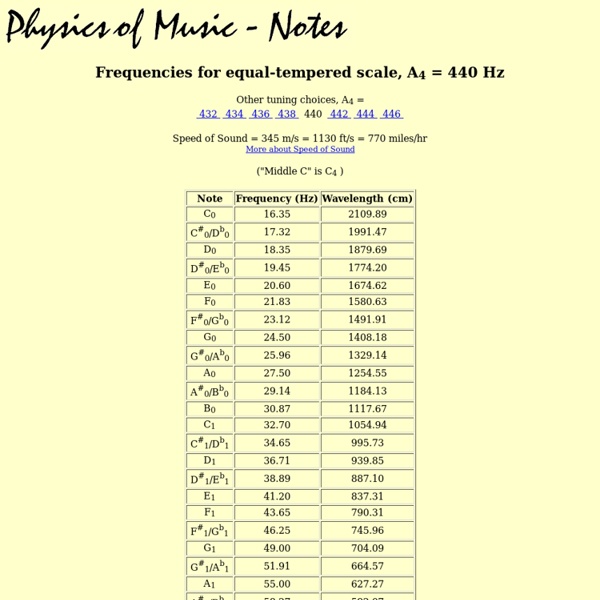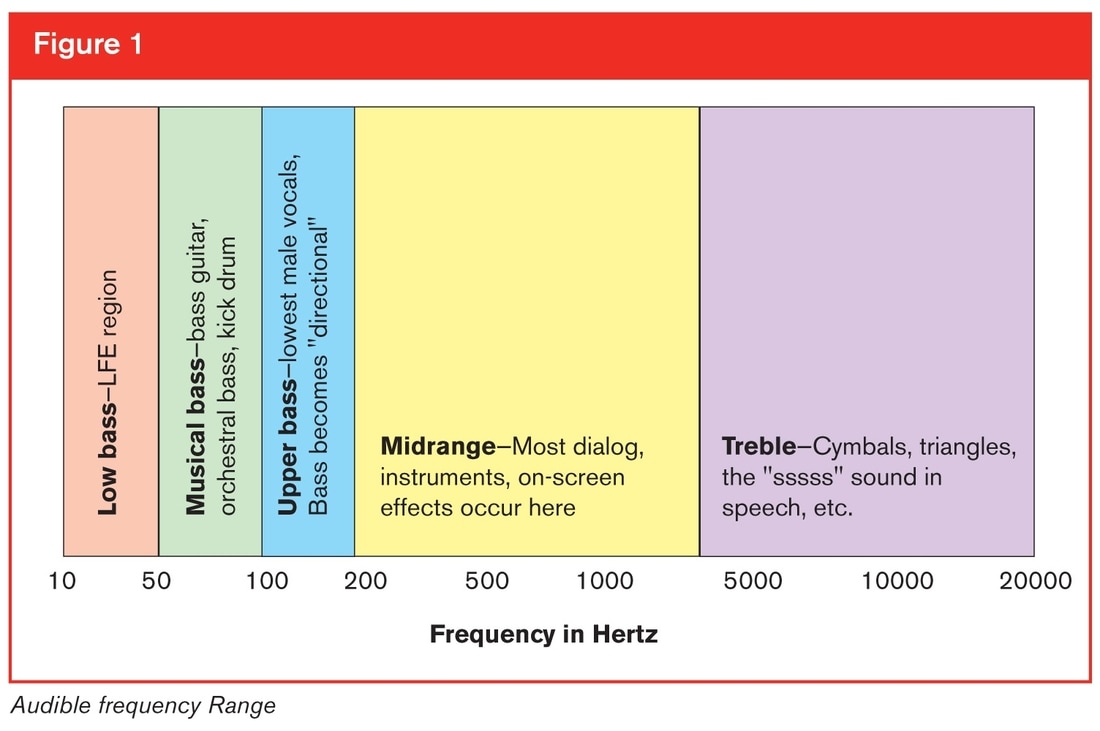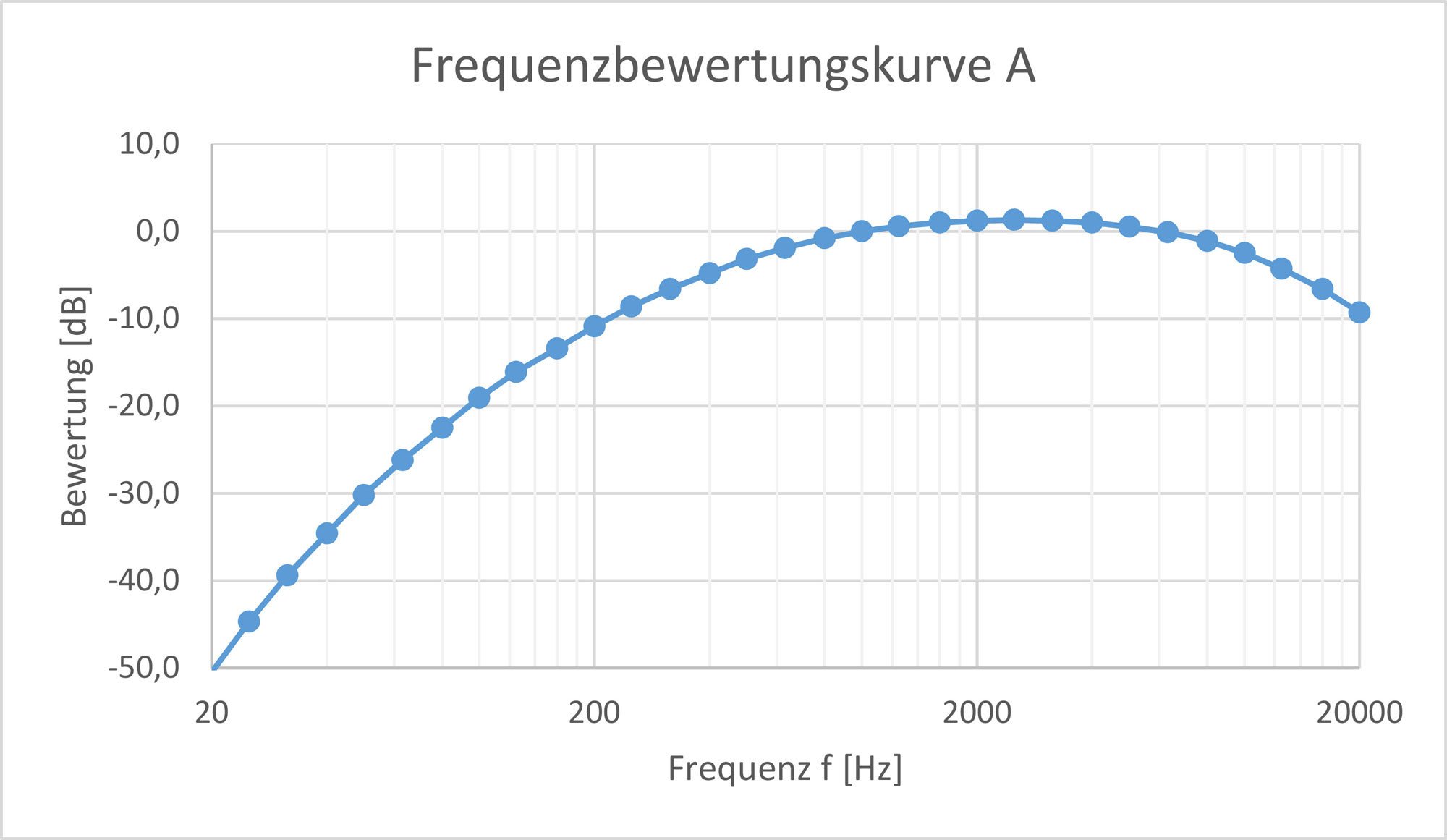
Understanding Vibrational Frequency Cracking the Sound Code The Blog of Leonard Carter
There are two ways to calculate the note frequency of a note. The first is by counting and dividing the number in Hertz (Hz) from 1200, this would be written as "1200 Hz" or "1200.". The second method for calculating note frequencies is using the octave scale where there are twelve notes per octave, which range from 200-2000 Hz.

Note To Frequency Chart
Click on any of the frequencies to play a tone with that note/frequency, just make sure your volume is not set too high, the high pitched notes can be especially intense. the values are in Hertz (Hz), the top row represents the octave (from 0 to 8) Note that this note frequency chart is for an equal-tempered scale, and uses A4 at 440 Hz as the.

Wie funktioniert Ultraschall? Stiftung Gesundheitswissen
2300-2495 MHz. Tropical Band; but the FCC allowed WWCR in Nashville, Tennessee to broadcast here. 90 meters. 3200-3400 MHz. Tropical Band: used mainly by stations in the tropics. 75 meters. 3900-4000 MHz. Shared with the US Ham Radio Bands. Restricted to 3950-4000 kHz in Europe, Africa and the Middle East.

Frequenz KiwiThek
1 H z = 1 / s {\displaystyle \mathrm {1\,Hz=1/s} } Benannt nach. Heinrich Hertz. Abgeleitet von. Sekunde. Das Hertz ( Einheitenzeichen: Hz) ist die SI-Einheit der Frequenz. Sie gibt die Anzahl sich wiederholender Vorgänge pro Sekunde in einem periodischen Signal an. Die Einheit wurde 1930 nach dem deutschen Physiker Heinrich Hertz benannt.

Tabela De Frequencia Hertz EDULEARN
A number of calculations useful to builders of stringed musical instruments require the frequency or wavelength of a note as input data. The following table presents the frequencies of all notes in ten octaves to a thousandth of a hertz. Octaves are presented in the Scientific Pitch Notation format, also commonly referred to as American Pitch.

Frequencies of Musical Notes, A4 = 440 Hz Pearltrees
442. 444. 446. Speed of Sound = 345 m/s = 1130 ft/s = 770 miles/hr. More about Speed of Sound. ("Middle C" is C 4 ) Note. Frequency (Hz) Wavelength (cm)

RPM to Hertz (rpm to Hz) conversion chart for frequency Measurement Conversion chart, Chart
Kleiner Hinweis schon mal am Rande: Ab 1000 Hz wird zur Vereinfachung meistens 1 kHz (ausgesprochen Kilohertz) geschrieben. 5000 Hz sind dann z.B. 5 kHz. Hier nun die Frequenztabelle als PDF, die ihr euch kostenlos herunterladen könnt. Es ist empfehlenswert, diese auszudrucken, wenn ihr beginnt einen Song abzumsichen.

Pitch and Frequency Science News
Dies ist eine Zusammenstellung von Frequenzen verschiedener Größenordnungen zu Vergleichszwecken. Die Angaben sind oft als „typische Werte" zu verstehen, die gerundet sind. Die im internationalen Einheitensystem festgelegte Einheit der Frequenz eines periodischen Vorgangs ist das Hertz (Einheitenzeichen Hz). Sie ist von der Basiseinheit Sekunde abgeleitet mit 1 Hz = 1 s −1 = 1/s.

Convertir De Khz A Hz Guía Práctica Para Entender Las Frecuencias Dlmodz
Durch Töne mit einer Frequenz von 741 Hz wird es aktiviert, was die Wahrheit und den Ausdruck fördert. Drittes Auge Chakra (Ajna): Steht für Intuition und Einsicht, ermöglicht Klarheit und visionäres Denken. Die Frequenz von 852 Hz wird genutzt, um das dritte Auge zu öffnen und Intuition zu schärfen.

Convertir Ghz A Hz Guía Completa En 2023 xclusive news
Scales in Music - A Tonal System. Acoustics of Music - Part 4. Frequency Table. Continuing our series about the Acoustics of Music, we are proceeding here with a very cool chart, the Frequency Table, showing the frequencies of sound commonly associated to music in general.. The frequency table shown below provides the pitch name and its' associated numerical frequency for all notes over.

Note frequencies in Hz Download Table
18. September 2019. Du suchst eine Frequenztabelle, die Dir verrät, welche Noten welche Frequenzen haben? Dann ist dieser Artikel genau richtig für Dich! In diesem werde ich Dir erklären, was ein Ton ist und was der Zusammenhang zwischen einer Note und einer Frequenz ist. Ganz unten findest Du auch eine Frequenztabelle im PDF-Format, die Du.

Table 3 Frequencies in hertz (Hz) and frequency levels in semitones counted (sc) up from C0
Kehrwert einer Sekunde. 1/s. = 2 π mal Frequenz. (Wenn es sich bei dem periodischen Vorgang um eine Drehbewegung handelt, fällt der Begriff der Kreisfrequenz mit der Winkelgeschwindigkeit zusammen. I. A. ist das nicht der Fall und daher ist die Maßeinheit nicht Radiant pro Sekunde.) Drehzahl. Umdrehungen pro Minute.

Definition of frequency ranges.
7.83 Hz (Schumann-Resonanz) 7.83 ist die Schumann-Resonanz oder die Frequenz, die elektromagnetische Wellen in der Ionosphäre der Erde einnehmen. Dabei handelt es sich wohl um die nützlichste, bekannte Frequenz. Sie stimuliert die Freisetzung von Wachstums- und Sexualhormonen (N. Shealy). Der zerebrale Blutfluss im hinteren Teil des Gehirns.

Akustische Begriffe Frequenz und Schallwellenlänge Bauphysik Schallschutz
Audio Spectrum. The audio spectrum is the audible frequency range at which humans can hear and spans from 20 Hz to 20,000 Hz. The audio spectrum range spans from 20 Hz to 20,000 Hz and can be effectively broken down into seven different frequency bands, with each band having a different impact on the total sound. The seven frequency bands are:

Strahlung Leitfaden für Einsteiger Waveguard Blog
1 Hertz means one vibration cycle per second, 50 Hertz means 50 vibration cycles per second while 60 Hertz means 60 vibration cycles per second. Hz is a very small unit, usually coupled with kHz (kilohertz), MHz (Megahertz), GHz (Gigahertz) etc. kHz is frequency unit of alternating current (AC) or electromagnetic wave (EM), equal to 1000 hertz.

The Frequency Spectrum, Instrument Ranges, And EQ Tips dataisbeautiful
The hertz (symbol: Hz) is the unit of frequency in the International System of Units (SI), equivalent to one event (or cycle) per second. [1] [a] The hertz is an SI derived unit whose expression in terms of SI base units is s −1, meaning that one hertz is the reciprocal of one second. [2] It is named after Heinrich Rudolf Hertz (1857-1894.